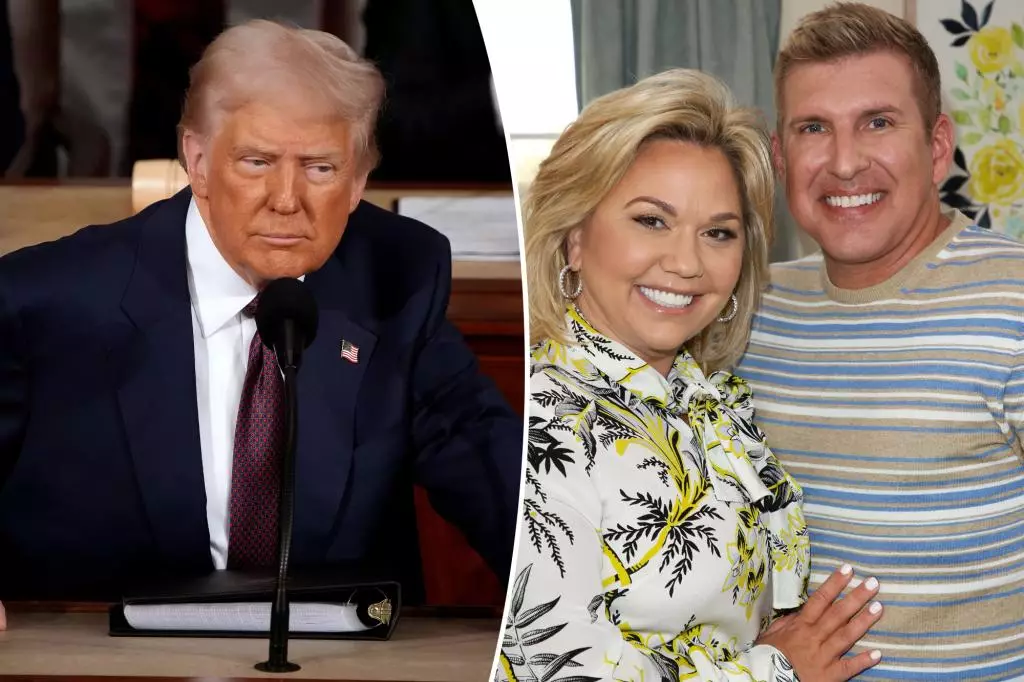The release of Todd and Julie Chrisley from prison following their pardons by President Trump has stirred a significant amount of media attention and public discourse. The couple, known for their reality TV show “Chrisley Knows Best,” were convicted in 2022 on serious charges of bank fraud and tax evasion. To many, their high-profile status and the circumstances surrounding their legal troubles raised questions about justice, privilege, and the use of political power.
Todd Chrisley, 56, who was serving a 12-year sentence, and Julie Chrisley, 52, who was sentenced to seven years, found themselves wrapped in a story that juxtaposes fame with heartbreak. Their convictions involved allegedly submitting fabricated documents to acquire loans and misrepresenting their financial status. The prosecution argued that they systematically manipulated the banking system for personal gain, painting the couple as opportunistic swindlers thriving on deception.
Despite these serious accusations, the Chrisleys’ release has been hailed by their legal team as a correction of a “deep injustice.” Attorney Alex Little articulated the defense’s position that the Chrisleys had been targeted not merely for their actions but rather due to their conservative values and the public scrutiny that accompanied their celebrity status. This raises an interesting point about how the law applies to public figures differently than it does to ordinary citizens. Are high-profile individuals subjected to harsher treatment simply because of their fame, or does their notoriety provide them with undue advantages?
The Politics Behind the Pardon
President Trump’s announcement about the pardons has also sparked discussions about the influence of political relationships in the judicial system. The former president took to social media to celebrate the Chrisleys’ release, emphasizing their character and implying that their legal troubles were unjust. By referring to them as “terrific people” in a phone call with their children, he effectively aligned himself with their narrative of innocence and victimization in the face of a biased legal system.
Critics, however, argue that such pardons reflect a troubling trend in which celebrity status and political connections can mitigate the repercussions of significant crimes. Rather than viewing the pardons as acts of justice, many interpret them as examples of privilege at work—a thought echoed by those who contend that the elite can navigate the judicial system with a greater capacity to deflect accountability.
Furthermore, in a climate where the public increasingly questions the integrity of the political and judicial systems, the Chrisleys’ case exemplifies a growing discontent with perceived injustices. If influential figures can bypass severe consequences through political favors, how does that affect public trust in the legal system? This situation raises pressing questions about equality before the law and whether the judicial process is truly unbiased.
The Ripple Effects of Reality Stardom
The Chrisleys’ dramatic fall from grace paints a larger picture of reality TV’s powerful influence on society. The genre often blurs the lines between entertainment and real life, enrapturing audiences with its portrayal of extravagant lifestyles. However, it also sometimes glamorizes unethical behavior. The Chrisleys, who once presented a family-centric narrative of wealth and success, have now become symbols of moral decline and the high cost of ambition gone awry.
For their fans and critics alike, their saga serves as a cautionary tale about the risks of public life and the fragility of reputation. The dichotomy of their lavish lifestyle juxtaposed against the backdrop of serious criminal charges strikes a chord in a society that frequently grapples with the concept of accountability. As they move forward from their release, the question remains: Can the Chrisleys successfully reintegrate into a society that now views them through a lens of skepticism?
Todd and Julie Chrisley’s release and the surrounding debates about their pardon inevitably reveal deeper societal issues surrounding justice, privilege, and the complicated relationship between fame and accountability. Their story is far from over; it serves not only as a personal narrative of redemption but also as a collective reflection on the values we uphold in our legal and social systems.

